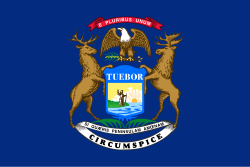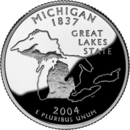Portal:Michigan
The Michigan Portal  Michigan (/ˈmɪʃɪɡən/ ⓘ MISH-ig-ən) is a peninsular state in the Great Lakes region of the Upper Midwestern United States. It shares water and land boundaries with Minnesota to the northwest, Wisconsin to the west, Indiana and Illinois to the southwest, Ohio to the southeast, and the Canadian province of Ontario to the east, northeast and north. With a population of 10.14 million and an area of 96,716 sq mi (250,490 km2), Michigan is the 10th-largest state by population, the 11th-largest by area, and the largest by total area east of the Mississippi River. The state capital is Lansing, while its most populous city is Detroit. The Metro Detroit region in Southeast Michigan is among the nation's most populous and largest metropolitan economies. Other important metropolitan areas include Grand Rapids, Flint, Ann Arbor, Kalamazoo, the Tri-Cities, and Muskegon. Michigan consists of two peninsulas: the heavily forested Upper Peninsula (commonly called "the U.P."), which juts eastward from northern Wisconsin, and the more populated Lower Peninsula, stretching north from Ohio and Indiana. The peninsulas are separated by the Straits of Mackinac, which connects Lake Michigan and Lake Huron, and are linked by the 5-mile-long Mackinac Bridge along Interstate 75. Bordering four of the five Great Lakes and Lake St. Clair, Michigan has the longest freshwater coastline of any U.S. political subdivision, measuring 3,288 miles. The state ranks second behind Alaska in water coverage by square miles and first in percentage, with approximately 42%, and it also contains 64,980 inland lakes and ponds. In the 17th century, French explorers claimed the Great Lakes region for New France, though the area had largely been inhabited for thousands of years by Indigenous peoples such as the Ojibwe, Odawa, Potawatomi, and Wyandot. French settlers and Métis established forts and settlements. Some people contend that the region’s name is derived from the Ojibwe word ᒥᓯᑲᒥ (mishigami), meaning "large water" or "large lake". While others say that it comes from the Mishiiken Tribe of Mackinac Island, also called Michinemackinawgo by Ottawa historian Andrew Blackbird, whose surrounding lands were referred to as Mishiiken-imakinakom, later shortened to Michilimackinac. After France's defeat in the French and Indian War in 1762, the area came under British control and later the U.S. following the Treaty of Paris (1783), though control remained disputed with Indigenous tribes until treaties between 1795 and 1842. The area was part of the larger Northwest Territory; the Michigan Territory was organized in 1805. Michigan was admitted as the 26th state on January 26, 1837, entering as a free state and quickly developing into an industrial and trade hub that attracted European immigrants, particularly from Finland, Macedonia, and the Netherlands. In the 1930s, migration from Appalachia, the Middle East and the Great Migration of Black Southerners further shaped the state, especially in Metro Detroit. Michigan has a diversified economy with a gross state product of $711.481 billion as of Q3 2024, ranking 14th among the 50 states. Although the state has developed a diverse economy, in the early 20th century it became widely known as the center of the U.S. automotive industry, which developed as a major national economic force. It is home to the country's three major automobile companies (whose headquarters are all in Metro Detroit). Once exploited for logging and mining, today the sparsely populated Upper Peninsula is important for tourism because of its abundance of natural resources. The Lower Peninsula is a center of manufacturing, forestry, agriculture, services, and high-tech industry. (Full article...) Entries here consist of Good and Featured articles, which meet a core set of high editorial standards.
Powder House Island (also known as Dynamite Island) is an artificial island on the lower Detroit River in southeast Michigan, directly adjacent to the Canada–United States border. It was constructed in the late 1880s by the Dunbar & Sullivan Company to store explosives during their dredging of the Livingstone Channel, with the purpose of circumventing an 1880 court order forbidding the company to store explosives on nearby Fox Island. Powder House Island was the location of dynamite storage sheds, as well as a dynamite factory and several ice houses. During this time, it was the site of a series of accidents, including fires in 1895 and 1919 (which both burned the island "to the water's edge"). Twenty short tons (18,000 kg) of the island's dynamite exploded in 1906 after two men "had been shooting with a revolver" near it; while there were no deaths (and only minor injuries to the two men), windows were shattered 3 mi (4.8 km) away and the explosion was clearly audible from 85 mi (137 km) away. (Full article...) Selected picture - U.S. Highway 127 (US 127) runs for 214.12 miles (344.59 km) in the U.S. state of Michigan. The highway enters Michigan from Ohio south of Hudson and ends at a partial interchange with I-75 south of Grayling. Prior to 2002, US 127 ended at I-69 north of East Lansing, a total of approximately 83 miles (134 km). Did you know -
Related portalsSelected article - The Detroit Tigers are an American professional baseball team based in Detroit. The Tigers compete in Major League Baseball (MLB) as a member club of the American League (AL) Central Division. One of the AL's eight charter franchises, the club was founded in Detroit as a member of the minor league Western League in 1894 and is the only Western League team still in its original city. They are also the oldest continuous one name, one city franchise in the AL. Ty Cobb, who played his first season with Detroit in 1905, later became the first Tiger to be inducted into the National Baseball Hall of Fame in 1936. Since their establishment as a major league franchise in 1901, the Tigers have won four World Series championships (1935, 1945, 1968, and 1984), 11 AL pennants (1907, 1908, 1909, 1934, 1935, 1940, 1945, 1968, 1984, 2006, 2012), and four AL Central division championships (2011, 2012, 2013 and 2014). They also won division titles in 1972, 1984, and 1987 as a member of the AL East. Since 2000, the Tigers have played their home games at Comerica Park in Downtown Detroit. (Full article...) Selected biography -George Wilcken Romney (July 8, 1907 – July 26, 1995) was an American businessman and politician. A member of the Republican Party, he served as chairman and president of American Motors Corporation from 1954 to 1962, the 43rd governor of Michigan from 1963 to 1969, and 3rd secretary of housing and urban development from 1969 to 1973. He was the father of Mitt Romney, who served as one of the United States senators from Utah and formerly was a governor of Massachusetts and the 2012 Republican presidential nominee; the husband of 1970 U.S. Senate candidate Lenore Romney; and the paternal grandfather of former Republican National Committee chair Ronna McDaniel. Romney was born to American parents living in the polygamist Mormon colonies in Mexico; events during the Mexican Revolution forced his family to flee back to the United States when he was a child. The family lived in several states and ended up in Salt Lake City, Utah, where they struggled during the Great Depression. Romney worked in a number of jobs, served as a Mormon missionary in the United Kingdom, and attended several colleges in the U.S. but did not graduate from any of them. In 1939, he moved to Detroit and joined the American Automobile Manufacturers Association, where he served as the chief spokesman for the automobile industry during World War II and headed a cooperative arrangement in which companies could share production improvements. He joined Nash-Kelvinator Corporation in 1948, and became the chief executive of its successor, American Motors, in 1954. There he turned around the struggling firm by focusing all efforts on the compact Rambler car. Romney mocked the products of the "Big Three" automakers as "gas-guzzling dinosaurs" and became one of the first high-profile, media-savvy business executives. Devoutly religious, he presided over the Detroit stake of the Church of Jesus Christ of Latter-day Saints. (Full article...) General imagesThe following are images from various Michigan-related articles on Wikipedia.
TopicsCategoriesSymbols
Lists
Related pagesWikimediaThe following Wikimedia Foundation sister projects provide more on this subject:
Things you can doDiscover Wikipedia using portals | ||||||||||||||||||||||||||||||||||||














































































